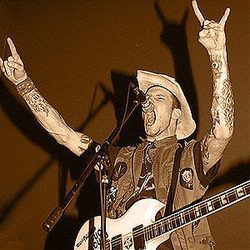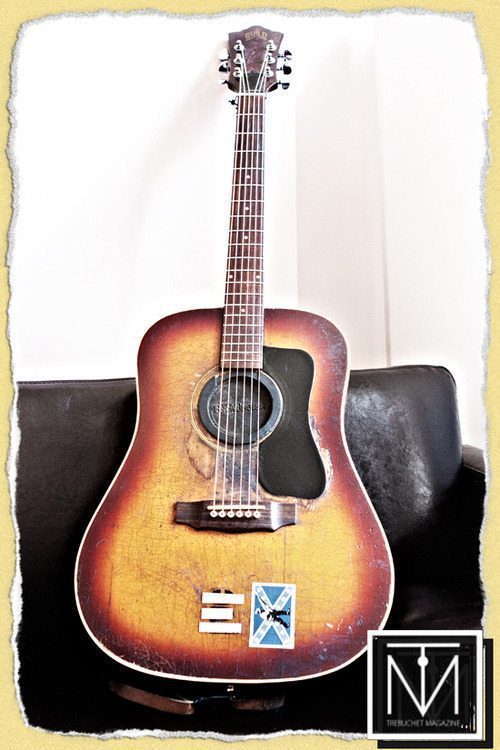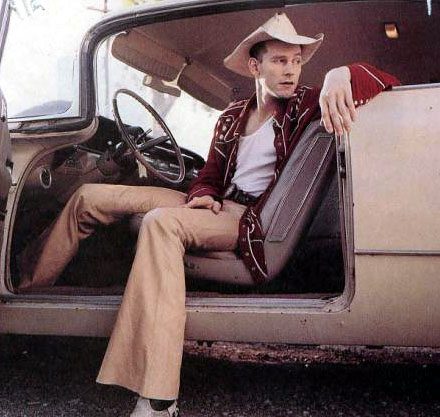'when people come to see me, I want to give them a good time'
Most bands have enough problems getting out one album at a time. Not so for Hank 3, real name Shelton Hank Williams, also know as Hank Williams the Third, and grandson of the legendary country singer Hank Williams.
Diagnosed with hyperactivity as a child and prevented from recording for some time due to legal wrangles with his former record label, Curb, he says, “It’s been hard for me to sit still”. He released four albums simultaneously in September 2011 – the country/ hellbilly double album Ghost to a Ghost/Gutter Town, stoner rock Attention Deficit Domination and lastly speed metal blended with the chants of cattle auctioneers, Cattle Callin’ by his 3 Bar Ranch project.
Rather than have support bands, his gigs consist of all of these projects in that order. This causes some confusion when he plays the Electric Ballroom in Camden on 20th June 2012, as some of the country fans turn up part of the way through the gig and find they have missed most of what they came to see. As a result, a number of bewildered looking bearded biker types, flat-topped psychobillys and quiffed rockabillys either leave the venue or seek refuge in the bar area during the second half of the gig.
bewildered looking bearded biker types, flat-topped psychobillys and quiffed rockabillys
Meanwhile in front of the stage are a considerable number of younger black-clad stoner rock fans, some also bearded, slowly headbanging to the drone of the darker music ,and hypnotised by the visuals projected onto the backdrop. It is notable that many of these arrive in time for the country set and seem to be enjoying that too, perhaps an illustration that the kids are more open-minded than the ageing rolled-up 501s and wallet-on-a-chain brigade.
The different sets are perhaps not as disparate as might first appear; the backing vocals in the song, 'Ghost to a Ghost”'have a metallic growl. Hank himself changes appearance between bands – during the country set his long hair is hidden under a baseball cap, for the stoner rock set the cap comes off and he literally lets his hair down. Suddenly he is no longer simply the grandson of Hank Williams but a musician who can hold a black candle to any other in the doom genre.

As has been widely remarked upon, Hank 3 bears a strong facial resemblance to his grandfather. Despite the hellbilly apparel, the man who put the “cunt” in “country” and the “dick” in “Dixie” has a slightly sickly vulnerability to his appearance, although his eyes betray the steely determination of a grafter who has strived to find and follow his own path in life. He eats only once a day and gets ill every tour, but drinks coconut water and athletic drinks to preserve the country twang in his voice on the advice of his vocal coaches.
He squats on the floor during the interview and won’t allow our photographer to take any pictures due to a problem with his right eye. He lacks the obvious redneck macho stance of his father, Hank Williams Junior, who is a successful country music artist and unapologetic reactionary.
lacks the obvious redneck macho stance of his father
Despite having been turkey hunting with his father, he often displays a soft spot for animals. He has a couple of rescue dogs, one of them, Trooper, has even featured on the track “Troopers Hollar” (sic) on Ghost to a Ghost, and he has done a benefit gig for a dog shelter. It is clear that he subscribes to the sentiment of the old country tune that a four-legged friend will never let you down and that the dogs return the comfort and affection that he gives them.
One wonders if he sees in these dogs the outsider that he perhaps sees in himself – neither the aggressive traditional male like his father nor the good Southern boy (he has the claim to fame of having the first country album with a parental advisory label) but a lost soul; maybe he would prefer to be anonymous like the strays rather than living in the shadow of family ghosts.
In his words, “I was raised on farms a lot in my youth so I was just around animals and I didn’t really sit that well with, ok if a dog gets run over you throw him in a corner, if he survives, he does and if he doesn’t, he dies and those kind of things were always just not right with me. So my therapy has been working with animals, doing rescues… most dogs know that they’ve been rescued and it’s therapy for me and it’s a way for me to go out in Nashville and to work without any Hank attachment to it. People are looking at me as like, ok you’re someone else just helping us in our cause, he’s doing this on his spare time… if I see a dog on the run and I kneel down and try to get it, it’s going in the van with me and I’ll try and hook him up on a home through myspace or facebook”.
Although not a vegetarian (he feels it would be difficult on the road) he only hunts animals to eat and rejects the idea of trophy kills. “If I’m killing it then I’m eating it. I’m not doing the trophy hunting kill to kill… why people pay ten thousand dollars to go kill something and just have the head hung on their wall, where I have always, if I kill a deer I eat it, if I shoot a turkey I eat it, if I catch a fish I eat it…”
if I kill a deer I eat it, if I shoot a turkey I eat it
The lyrics of the country songs frequently reference the South and there is no doubt that Hank is deeply attached to his geographical roots, “I love Tennessee, I like the four seasons, I like the heat of the South, I like the humidity of the South and all those things,” and he takes pride that he has kept in touch with the friends he grew up with, with whom he shared a mosh pit,
“It’s all the same guys, we’re just getting older, you know. I’m 40 now and everybody’s just a little more feeble, and our kids are getting older and we’re trying to live like we’re 17 every day and it just doesn’t, sometimes it’s not as easy…. I’m still close to my friends, it’s just when I go home from a tour I have to isolate a little bit just to put myself back together because when you’re living in a bar every day and everyone else wants to go to a bar and it’s, well maybe after a couple of weeks, you know? But it’s a little different. But I would say I’m still the same. I still see my old friends and Nashville’s very small, from old to young, I’m still going to see them”.
I notice that a battered guitar decorated with a faded confederate flag sticker sits on the dressing room sofa. Much has been said about the use of the confederate flag in country and rockabilly music and while it is true that for some musicians it simply shows homage to their Southern background, it also goes without saying that anyone brought up in the Southern States is aware of the significance in respect of the racial connotations, perhaps unlike some British musicians.

I ask him what he thinks about the lyrics of a song called '2012' by his friend Bob Wayne, which some people consider to be racist towards Muslims in particular. He tells me that he is not familiar with the song, but looks uncomfortable and fails to condemn any such sentiments, “I’m just, that’s not me, so if Bob is pushing some envelopes, he, it is what it is. I don’t know. I mean if he’s being racist, well it’s hard to say.
"I’ve been in a band with a heavy metal king who’s, you know, as big as Ozzy in the US, and he has form and been a lot more racist than Bob Wayne, I can tell you that,” and continues, “I don’t even go there, I mean I stay out of politics, I stay out of war and all that shit as much as possible ‘cos when people come to see me, I want to give them a good time and I don’t study politics enough to have the right to say something. I leave that to Jello Biafra and all these people that really know what they’re talking about”.
Interestingly, however, the images projected onto the backdrop during the Attention Deficit Domination set are not merely the standard stoner images of graveyards and ravens. True, there are plenty of UFOs and aliens but they are interspersed with the history of US foreign policy in Central America during the 1980s. There doesn’t appear to be any particular message being pushed here, but it is slightly incongruous that one who makes much of being non-political would choose such images.
While Hank may choose to pass the buck on the race issue, he certainly shows some punk spirit in his attitude to the music business. Given his admiration for Biafra and for Henry Rollins, two men who are anything but redneck hillbillys, and his self-recording and self-releases, it would appear that his passion for DIY is genuine. But one also wonders whether it is not a deliberate sabotage of his potential popularity, a desire not to be in any hall of fame but rather to be able to meet his old friends in the same old bars instead of cashing in on his family legacy. Or maybe even a fear of trying and of not making the grade.
one of my big lines is shooting down fame to do it my own way
He says, “It depends what you’re in it for and for what I’m in it for. Major labels just really haven’t, I’ve never worked on a major label that respected what I did and if you really look at one of my big lines is shooting down fame to do it my own way… and I don’t have management or any of that stuff Their goal is to expose you and make you this huge corporate thing and I’ve always known my sound, I’ve known my songs, I know what I like to do.
"I can reach a lot more people in a small bar than I can in a big festival because I get to do my show, my whole entire show, they get to see it and then I get to go down there and if they have something good or bad to say to me, they can talk to me and at a festival, this much further away from them, there’s no way to get to your crowd… I can connect to 200 people more than I can to 60,000 so that’s just me, I don’t know.
"Record labels, it’s interesting but for what I do, I just need good distribution… you know, my grandfather was huge, my dad was huge, well it sounds like and it seems like I’m supposed to be that guy that’s supposed to be in the underground and not supposed to be over-the-top successful. Maybe at the first of the night there might be 500 people and at the end of the night when I’m doing my rock stuff, there might still be 40 or 50 standing, and that’s my way of not selling out and trying to be punk rock or independent for the select few kids that want to come and see what the masses don’t want to see. It’s more so in the States where you can really see the diversity of… ok, there’s 1,000 people for the country, when we start doing the rock, only a few stay, the select few. 'For the few' is our motto”.

To be fair, there were many more than 40 or 50 at the Electric Ballroom for the second half of the gig, but maybe that’s just Camden for you. He hates a few streets in Nashville “’cos it’s just about going in an office and writing a song and making a marketing plan to have this guy have a number one song. It’s not what Johnny Cash and Willie and Waylon and all the legends were doing… Radio DJs used to play music because they wanted to hear something new, we want to play it for you; they didn’t play music because they were paid to”.
If the responsibility of carrying the Hank Williams musical legacy weighs heavily upon his skinny shoulders, he is keen to avoid his own 21 year-old son being pressurised to continue the family business. He is pleased that his son is studying, “I’m not going to push him to do music, I’m going to push him to stay in school while he can ‘cos you’ve got the rest of your life to quit and not look back, so he’s doing college,” and he speaks affectionately about him,
“He’s a dreadheaded kid, we have a lot of things in common, you know he got to go through all my old t-shirts and pick out the ones that he likes, we have a lot of the same appreciation for the same kinds of music, we were in a mosh pit together with Philip Anselmo (singer for Pantera and Down, who played guitar in Arson Anthem, a previous project where Hank 3 played drums) and Kirk Windstein (guitarist for Crowbar and Down) and all these guys not even five weeks ago”.
just breaking even really, that’s my goal
So how does he follow up releasing several albums together? What does the future hold for Hank 3? “Well right now it’s just breaking even really, that’s my goal, if I can break even on the records then I will go home and put it back together a little bit and who knows if it’s going to be a hillbilly record or if it’s going to be me and Wayne ‘The Train’ Hancock doing a record together or a blues project or whatnot.”
He finds touring exhausting, “I look at these guys like Iggy Pop, Adam Ant, Lemmy, Willie Nelson, that’s done it their whole life and they’re still out there doing shows, that kind of amazes me because I know the burn of the road,” yet addictive,
“I always said I would retire the road when I was 50 and then enjoy the other side of life but when I see all these older guys that are still hanging in there, it’s just like the old Moby Dick tale, what do you get up for every day, you get up to catch that big whale, you know, it’s kind of the same thing, we’re getting up to go out there and play music and that’s what’s keeping us going right now. But right now I’m day-by-daying it, it’s really hard to say where I’ll be in 10 years from now”.
Guitar Image by Carl Byron Batson



















